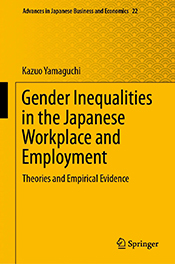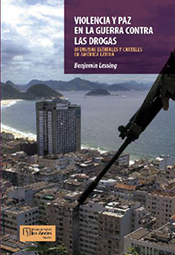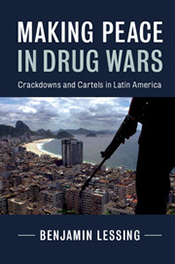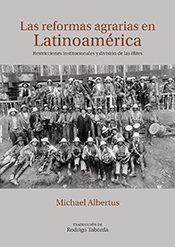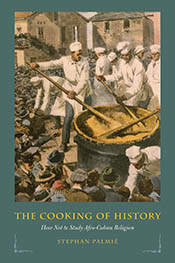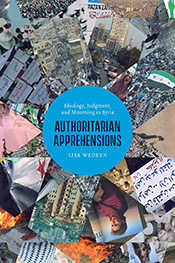Translation Publications
Gender Inequality in the Japanese Workplace
Kazuo Yamaguchi, Ralph Lewis Professor of Sociology
Despite efforts by the Japanese government to pass legislation promoting the economic activity of women, Japan is not making progress in gender equality compared to other countries. Kazuo Yamaguchi offers a comprehensive analysis of employee data and employer personnel policy data that account for the wage gap, gap in promotion to managerial positions, professional job segregation, and inequality in labor productivity experienced by employed Japanese women. In addition to reviewing theories of gender inequality developed in the U.S. and Europe and the historical development the Japanese employment system, the book's analysis has important implications for policies aiming to eliminate gender inequality in Japan.
Gender Inequalities in the Japanese Workplace and Employment: Theories and Empirical Evidence (in English) was published by Springer in their Advances in Japanese Business and Economic Series in June 2019. Gender Inequality in the Japanese Workplace, originally published in Japanese, was awarded the 2017 Nikkei Economic Books Culture Award in Japan, given annually to a few books.
To reach the audience most affected in Latin American, CISSR is supporting the Spanish and Portuguese translations for Making Peace in Drug Wars, which are in progress.
Violencia y Paz en La Guerra Contra Las Drogas:
Ofensivas Estatales y Carteles En América Latina
Benjamin Lessing, Associate Professor of Political Science
A lo largo de los últimos treinta años una nueva forma de conflicto ha devastado los países más grandes de América Latina: carteles armados combaten no solo entre ellos sino contra los gobiernos nacionales. En Colombia, Brasil y México, las autoridades han procurado desmantelarlos con el fin de restaurar la ley y el monopolio de la fuerza por parte del Estado. Sin embargo, los carteles han respondido con brutalidad, valiéndose de balas y sobornos, lo que ha desatado espirales de violencia y corrupción que convierten en bromas los intentos de los gobernantes de construir país. Por fortuna, algunas reformas políticas han reducido el conflicto entre los carteles y el Estado, pero resultan muy difíciles de sostener a lo largo del tiempo. ¿Por qué los carteles luchan contra un gobierno, si no es para derrocarlo o separarse de este? ¿Por qué algunas medidas represivas estatales desencadenan o exacerban el conflicto entre carteles y Estado, mientras que otras lo disminuyen? En Violencia y paz en la guerra contra las drogas, Benjamin Lessing argumenta que la represión de la fuerza bruta incentiva una respuesta defensiva por parte de los carteles, mientras que las políticas de represión condicional pueden aligerar eficazmente dicho conflict. Sin embargo, la guerra contra las drogas hace que las políticas de represión condicional sean demasiado frágiles. Published by Universidad de Los Andes Press / CESED and translated by Patricia Torres Londoño, this translation of Professor Lessing's 2018 book, Making Peace in Drug Wars: Crackdowns and Cartels in Latin America, was originally published by Cambridge University Press. Read more about that below.
Making Peace in Drug Wars: Crackdowns and Cartels in Latin American
Benjamin Lessing, Associate Professor of Political Science
Over the past thirty years, well-armed drug cartels have fought not only each other but the state itself, though with no clear goal of toppling or seceding from them. Using case studies of Brazil, Colombia, and Mexico, Benjamin Lessing examines how some state crackdowns utilizing brute-force repression have triggered and exacerbated cartel-state conflict, while condition repression strategies have curbed it. Ultimately, states must reframe the challenge as stopping violence rather than trying to combat the drug trade, eliminate corruption, and reduce violence all at the same time. The book is the first comparative study of a new form of armed conflict that has ravaged Latin America’s largest countries, with well-armed drug cartels fighting not only one another but the state itself.
Making Peace in Drug Wars: Crackdowns and Cartels in Latin America was published in English by Cambridge University Press in November 2017 as part of their series Cambridge Studies in Comparative Politics. The book was selected by CHOICE as an Outstanding Academic Title for 2018.
Las Reformas Agrarias en Latinoamérica:
Restricciones Institucionales y División de Las Élites
Michael Albertus, Associate Professor of Political Science
¿Cuándo y por qué los países redistribuyen la tierra a los sin tierra? ¿A qué fines políticos sirve la reforma agraria y qué lugar ocupa en el mundo actual? Una literatura de larga data que se remonta a Aristóteles y que se repite en importantes trabajos recientes sostiene que la redistribución debería ser tanto mayor como más dirigida a los pobres bajo la democracia. Sin embargo, faltan datos históricos completos para probar esta afirmación. Este libro muestra que la redistribución de la tierra, la forma más importante de redistribución en el mundo en desarrollo, ocurre con más frecuencia bajo dictaduras que bajo democracia. Ofrece una teoría novedosa de la reforma agraria y desarrolla una tipología de políticas de reforma agraria. Albertus aprovecha los datos originales que abarcan el mundo y que se remontan a 1900 para probar ampliamente la teoría utilizando análisis estadísticos y estudios de casos de países clave como Egipto, Perú, Venezuela y Zimbabwe. Estos hallazgos exigen repensar gran parte de la sabiduría común sobre la redistribución y los regímenes.
Published by Editorial Universidad del Rosario and translated by Rodrigo Taborado, this translation of Professor Albertus’ 2015 book, Autocracy and Redistribution: The Politics of Land Reform, was originally published by Cambridge University Press.
The Cooking of History: How Not to Study Afro-Cuban Religion
Stephan Palmie, Norman & Edna Freehling Professor of Anthropology and of Social Sciences in the College; Director of Undergraduate Studies
Stephan Palmié's "The Cooking of History" critically examines the implicit assumptions embedded in the term "Afro-Cuban religion." Palmié offers a nuanced critique of both the anthropology of religion and the scholarship on the cultural history of the Afro-Atlantic World. He contends that anthropologists, many of whom have embraced the religions they study, wield significant influence on present-day practices by anchoring their arguments in the concept of an ancestral African past and asserting the authentication of these religions through their research findings.
Drawing on his extensive lifelong study of Cuban Santería and other Orisha-worshipping religions, he traces the collaborative efforts between scholars and their informants or conversation partners. Palmié unveils the development of a global network of religious traditions, challenging the pervasive belief that religious practices are static and self-contained.
"The Cooking of History" was originally published in English by University of Chicago Press. It emerges as a multifaceted work—part auto-ethnography, detailing the process of self-making, part historical ethnography, and part tribute to the pioneers and carriers of this tradition.
Authoritarian Apprehensions: Ideology, Judgment, and Mourning in Syria
Lisa Wedeen, Mary R. Morton Distinguished Service Professor in the Department of Political Science and the College
In "Authoritarian Apprehensions," Lisa Wedeen offers a compelling analysis of Arab uprisings, which were initially seen as a shift toward liberal democracy but ultimately resuled in a global resurgence of authoritarianism. Drawing on her extensive engagement with Syria, Wedeen explores the journey from revolutionary euphoria to heightened violence.
This study delves into cultural production amid power dynamics, providing a fresh and imaginative approach to understanding authoritarianism and conflict. Wedeen addresses key areas of questioning, such as the maintenance of citizen loyalty despite atrocities, political judgment in the face of misinformation, and lessons from Syria's experience with digital media manipulation. The book encourages contemplation on political judgment in a reality where facts no longer hold the same influence.
"Authoritarian Apprehensions" serves as evidence of Wedeen's commitment to addressing crucial political issues. It enhances our comprehension of current dynamics by delving into the intricate relationships between power, ideology, and societal reactions to authoritarian challenges.
Authoritarian Apprehension was originally published by University of Chicago Press. An Arabic translation is being produced.
Reading Machiavelli: Scandalous Books, Suspect Engagements, and the Virtue Of Populist Politics
John McCormick, Professor of Political Science
"Reading Machiavelli" by John McCormick delves into the complex character of Niccolò Machiavelli, challenging traditional interpretations and shedding light on a radically democratic populism within his works. The book critically examines Machiavelli's major political writings—The Prince, Discourses, and Florentine Histories—dispelling misconceptions propagated by thinkers like Rousseau, the Straussians, and the Cambridge school. McCormick highlights the essential elements of Machiavellian politics, emphasizing the utility of class conflict for virtuous democratic republics, the need for political and economic equality for genuine civic liberty, and the role of religious tropes in effective popular judgment.
The narrative exposes an elite conspiracy to suppress Machiavelli's egalitarian politics, challenging established readings by scholars like Leo Strauss and Quentin Skinner. McCormick's work acts as a Machiavellian critique of previous scholarship, unveiling the concealed quality of Machiavelli's populism. By providing fresh interpretations of Machiavelli's works and correcting historical misreadings, "Reading Machiavelli" not only contributes to Machiavelli scholarship but also offers a new perspective on how politics should be conceptualized and practiced. As this insightful exploration is translated into German, it promises to further enrich the understanding of Machiavelli's enduring political legacy.
Reading Machiavelli was originally published by Princeton University Press in 2018.
 THE UNIVERSITY OF CHICAGO
THE UNIVERSITY OF CHICAGO


